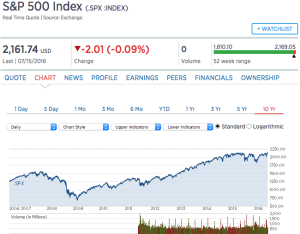
Stock markets hit record highs this week, and yet most people aren’t excited about it. Google “the most hated bull market in history” and you’ll find many reasons for pessimism–we just don’t trust this market. In normal times, this would indicate we are still healthy, as legendary investor Sir John Templeton once said:
“Bull markets are born on pessimism, grown on skepticism, mature on optimism, and die on euphoria.”
Yet we’re in anything but normal times. I often tell people that this is the most dangerous time to be investing in my lifetime, but then I have to say the next year is even more dangerous. Why? Because we continue going where no man has gone before. Most of us have investing experience (and life experience generally) where we try to compare what we see against the knowledge of an event played out in similar situations. But we don’t have any similar situation for our current reality of global central banks doing “whatever it takes.” And this past week we have more of “doing whatever it takes,” with the Japanese Prime Minister Shinzo Abe promising double-barreled (fiscal and monetary) stimulus as far as the eye can see. And China’s credit growth has resumed its torrid pace, with it’s record stimulus supporting GDP growth.
So stock markets are going higher, but it sure feels unhealthy. First because we like to think higher markets are suggesting underlying economic realities are good. But earnings are not rising, they are falling! The S&P 500 Index charted above is postured for its 4th straight quarterly earnings drop. This leads to valuation measures (such as the market price-earnings ratio) at extremely high historical levels. Why so high? In part because valuations are always “compared to what alternative.” Global central bank policies have led to a destruction of normal average yielding investments–its incredibly difficult to find safe 4-5% yields. Stocks are the only place to be when $10T in global bonds are now giving a negative yield. Think that through. When in history has anything like this happened? Market valuations are either pricing in much stronger earnings growth going forward (unlikely), or they are expecting this low rate/low growth regime to last for at least the next decade (more likely).
But this leaves markets very precarious. It was just a few weeks ago we had the Brexit panic, where $2T in market capitalization was lost in one day. How long can this inflated market last? That of course is unknown, given the global coordination of markets via central banks. People often talk about market manipulation, but there are two ways to think about it–direct and indirect manipulation. We don’t have direct implementation (usually) in this country with the U.S. Treasury or Fed directly buying market assets to prop up prices, but the Fed’s low interest policy does manipulate where we put our money. For instance, business investment continues below trend, yet firms are buying back their own shares at the highest rate post the recession (in Q1) because of the low cost of borrowing. This makes their earnings per share higher–because there are fewer shares outstanding–but they are no more productive than before.
So what’s this mean? I continue to believe markets are increasingly vulnerable to external shocks. When you get to the upper end of historical realities, you have the likelihood of a reversion to the mean. I thought this would likely come with the end of the Fed’s direct monetary stimulus (QE3) in Oct ’14, but it didn’t, as the global liquidity spigot turned on in Japan and the ECB and China. Yet while our markets haven’t gone down, they really haven’t gone anywhere, as the chart above shows. Yes we had record highs this last week, but we are only ~4-5% higher since Nov 2014, and this is on the back of a large short squeeze in the market post-Brexit. That doesn’t feel like much of a record.
Despite my oft-quoted “he who lives by the crystal ball eats lot of broken glass” I’ll step out on the limb. My sense is that Hillary Clinton is now on track to win the election, but it will be MUCH closer than anyone thinks. However, if the markets melt down, she is toast. Democrats are in charge, and their usual villain, Wall Street, has been chained to Mrs. Clinton by Bernie Sanders. And markets feel nervous (even if not captured in measures of market volatility like the VIX). Further, if terrorism ramps up, especially if here in America, she will lose. So for Trump fans, you have to hope for bad news. But the markets may yet give you what you’re looking for.
 Bert Wheeler
Bert Wheeler
 Jeff Haymond
Jeff Haymond
 Marc Clauson
Marc Clauson
 Mark Caleb Smith
Mark Caleb Smith
 Tom Mach
Tom Mach